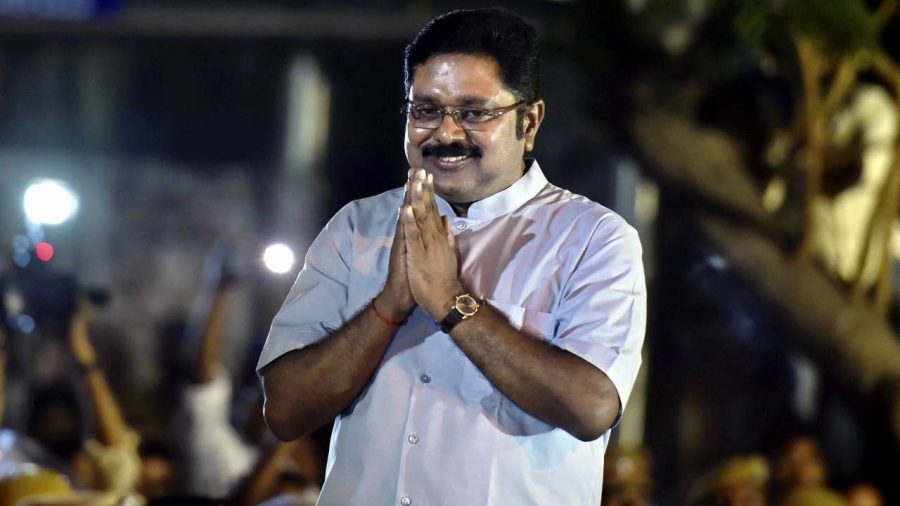
TTV Dhinakaran: The wild card entrant who may hamper BJP’s prospects

With the two major Dravidian parties forging broad alliances, the chief of Amma Makkal Munnetra Kazhagam (AMMK) — the breakaway party from the All India Anna Dravida Munnetra Kazhagam (AIADMK) — TTV Dhinakaran has announced publicly that his party will contest all seats across Tamil Nadu with the Social Democratic Party of India (SDPI) as a single-seat ally.
While the case over AIADMK’s election symbol did not turn out in his favour, he continues to iterate that his faction represents the soul of AIADMK. Further, he said that his party MPs would decide the prime ministerial candidate, indicating a close fight at a national level in the elections.
Apart from the Lok Sabha elections, Dhinakaran could cause larger damage to the Bharatiya Janata Party (BJP) as it looks to make inroads into Tamil Nadu through its alliance with the AIADMK. With the battle in the northern states looking difficult and fallout with an important partner — the Telugu Desam Party (TDP) — in Andhra Pradesh, Tamil Nadu is key for the BJP in compensating for losses.
Dhinakaran’s apparent base
While AMMK does not explicitly claim so, the dominance of the mukkulathors (a middle caste group, also called thevars, comprising three sub-castes — kallars, maravars, and agamudiyars — and accounting for a sizeable population of the state) is conspicuous in the party. And the buzz both within the party and among observers is that it seeks to consolidate the votes in the mukkulathor belt and then spread out. If one were to map the belt in terms of parliamentary constituencies, the caste group is numerically dominant in Ramanathapuram, Thanjavur, Theni, and Virudhunagar. It plays a significant role in Madurai, Mayiladuthurai, Sivaganga, Tenkasi (reserved for a Scheduled Caste candidate), Thoothukkudi, Tiruchirappalli and Tirunelveli. The above inference is made on the basis of the 1931 caste census and the observation that majority of the contesting candidates belong to this caste group.
The thevars are considered to be politically exuberant and have their people across political parties. For instance, there have been MPs from the community in the Indian National Congress (INC) and the Dravida Munnetra Kazhagam (DMK) as well. Moreover, there also exist small caste-specific parties like the Mukkulathor Puli Padai and factions of the All India Forward Bloc. The prevalent notion is that a sizeable proportion has voted for the AIADMK continuously and the small parties have pledged their support to bigger parties. However, analysis of election results gives us a different and an unclear picture.
The eleven mukkulathor-dominated constituencies named above have shown trends that do not satisfy a simple caste or party equation. The DMK and its alliances secured eight of the 11 constituencies in question during the 2009 general elections. The 2014 general elections saw a complete reversal with the AIADMK winning all 11 constituencies. The 11 parliamentary constituencies house six Assembly constituencies each, and the results of these 66 seats don’t reflect a clear allegiance to a particular party. The 2011 Assembly elections saw the AIADMK alliance winning 56 of the 66 seats, while the DMK alliance won remaining 10. The most recent 2016 elections saw a minor shift, with the AIADMK alliance winning 40 seats and the DMK alliance winning 26 seats.
On analysing the results in the four parliamentary constituencies (Ramanathapuram, Thanjavur, Theni and Virudhunagar), where the mukkulathor caste is numerically dominant, it was found that not one of the four constituencies had the same alliance in power in the two general elections that were conducted in the past 10 years. Eight out of 24 constituencies from the above mentioned parliamentary constituencies did not vote for the same party in the 2011 and the 2016 Assembly elections.
Trials of growing out of caste
Interestingly, instead of nurturing the caste element, Dhinakaran, in his public rallies, talks only about Amma i.e. the late chief minister J Jayalalithaa’s governance, and does not resort to caste references. The act of reinforcing her name, his choice in party name and the decision to contest the elections as a faction of the AIADMK imply that Dhinakaran is trying to appropriate a larger identity, one beyond caste, to garner support across castes by addressing the issues of the people. Notably, BJP’s unpopularity in Tamil Nadu is unmatched and, in this context, his speeches and press interactions present him as witty, composed and casual.
While breaking away from the AIADMK seemed to strip off the chance to garner support across caste groups for the AMMK, Dhinakaran’s decision to not go in for immediate alliances with other caste parties makes him come off as a stable player who’s in it for the long haul, unlike the BJP, which has hastily forged an alliance with parties like the Pattali Makkal Katchi (PMK) based on linear caste arithmetic, worsening its image further. However, with limited time left, his ability to win seats remains to be seen.
A few supporters of Dhinakaran and political observers believe that the AIADMK cadres will support his party on the ground as they are not happy with AIADMK’s functioning and subservience to the BJP. Dhinakaran claimed that most of the AIADMK workers are with him. When it comes to voters, senior members of the AIADMK are certain that AMMK’s presence will dent the AIADMK’s voter base as disheartened AIADMK loyalists will choose it over DMK. In this case, the party’s chances could go up and even occupy the second spot. For a person who claims to be a small player, Dhinakaran is here to stay and cannot be overlooked.
(The writer is a doctoral student at the King’s India Institute, King’s College London.)

